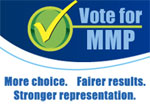This is an archive of news stories and research from the National Union of Public and General Employees. Please see our new site - https://nupge.ca - for the most current information.
Mixed Member Proportional (MMP) referendum to be held on Oct. 10
 Toronto (29 Aug. 2007) - The Ontario Public Service Employees Union (OPSEU/NUPGE) is urging members to vote 'Yes' in the referendum on electoral reform to be held Oct. 10, the same day Ontario votes in the next provincial election.
Toronto (29 Aug. 2007) - The Ontario Public Service Employees Union (OPSEU/NUPGE) is urging members to vote 'Yes' in the referendum on electoral reform to be held Oct. 10, the same day Ontario votes in the next provincial election.
The proposed new system of voting is called Mixed Member Proportional (MMP). The major change would involve casting two votes - on one ballot - instead of one vote.
The first vote would be for the candidate of choice in 90 individual provincial ridings, i.e. the time-honoured, first-past-the-post system that now exists. The candidate with the most votes would win in each of these ridings, regardless of the percentage vote received.
However, voters would also cast a second vote for their party of choice. And the outcome of this ballot province-wide would be used to elect 39 additional legislature members on a proportional basis (raising the total number of seats from the current 103 to 129).
These 39 seats would be apportioned by the popular vote. A party receiving 30% of the vote, for example, would be apportioned seats in a manner to match its percentage vote at the polls. The candidates chosen to fill the seats would be drawn in descending order from lists published by each party in advance.
The result would narrow inequities that now exist between the popular vote parties receive and the number of seats they win. For example, Ontario governments often win a majority of seats with significantly less than a majority of the vote. At the other end of the spectrum, parties routinely get fewer seats - sometimes far fewer - than the proportion of the votes they receive.
60% majority required to pass
A province-wide majority of 60% is required for the referendum to pass.
"Why should working people care about something like electoral reform?" asks OPSEU president Warren (Smokey) Thomas. "I like to deal in matters that concern the real, everyday lives of members. And, believe it or not, electoral reform is one of them," he says.
Thomas says first-past-the-post is inherently unfair and it is in the interest of citizens to change it. "Here's why," he adds.
"Remember when Ontarians faced severe cuts to public services in the 1990s? Remember Walkerton? The Harris government got 40% of the vote, or less, but was still able to slash services for people, even though the parties supported by the majority of voters opposed them. Our cities and towns are still dealing with the ramifications of these cuts. I thought we had majority rule, but I guess not."
The same situation could arise again if another government gets "a phony 40% majority" and uses it to privatize health care, fund private schools or cut other basic services, he adds.
"As voters themselves, OPSEU members are often forced to decide. Should they cast a 'wasted vote' for the party that most represents their views, but has no chance of winning locally? Or should they cast a 'strategic vote' for the party they dislike least? Some choice!" Thomas says.
"Under the proposed new system, known as mixed member proportional (MMP), we'll have two votes. One for a local member, and one for the voter's party of choice. If we personally like our local MPP, but prefer another party provincially, we can split our vote accordingly. With more proportionality, everyone wins," he adds.
"With electoral reform, we all could win. Vote yes to MMP." NUPGE
More information:
